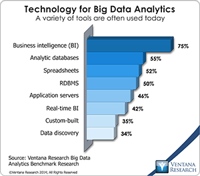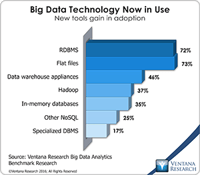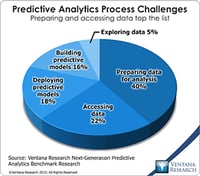The big data market continues to expand and enable new types of analyses, new business models and new revenues streams for organizations that implement these capabilities. Following our previous research into big data and information optimization, we’ll investigate the technology trends affecting both of these domains as part of our 2016 research agenda.
Read More
Topics:
Analytics,
Business Analytics,
Business Intelligence,
Data Preparation,
In-memory,
Information Management,
Operational Intelligence,
Uncategorized
Some followers of Ventana Research may recall my work here several years ago. Here and elsewhere I have spent most of my career in the data and analytics markets matching user requirements with technologies to meet those needs. I’m happy to be returning to Ventana Research to resume investigating ways in which organizations can make the most of their data to improve their business processes; for a first look, please see our 2016 research agenda on Big Data and Information Optimization. I relish...
Read More
Topics:
Big Data,
Predictive Analytics,
Analytics,
Business Analytics,
Business Intelligence,
Information Management,
Internet of Things,
Operational Intelligence,
Uncategorized,
Unicorns,
IT Performance Management (ITPM)
Throughout the course of our research in 2016, we’ll be exploring ways in which organizations can maximize the value of their data. Ventana Research believes that analytics is the engine and data is the fuel to power better business decisions. Several themes emerged from our benchmark research on incorporating data and analytics into organizational processes, and we will follow them in our 2016 Business Analytics Research Agenda:
Read More
Topics:
Big Data,
Predictive Analytics,
Analytics,
Business Analytics,
Business Collaboration,
Business Intelligence,
Cloud Computing,
Information Applications,
Information Management,
Operational Intelligence
As a technology, predictive analytics has existed for years, but adoption has not been widespread among businesses. In our recent benchmark research on business analytics among more than 2,600 organizations, predictive analytics ranked only 10th among technologies they use to generate analytics, and only one in eight of those companies use it. Predictive analytics has been costly to acquire, and while enterprises in a few vertical industries and specific lines of business have been willing to...
Read More
Topics:
Data Scientist,
Predictive Analytics,
Sales Performance,
Social Media,
Supply Chain Performance,
Analytics,
Business Analytics,
Business Intelligence,
Customer & Contact Center,
Workforce Performance,
IT Performance Management (ITPM)
I want to share my observations from the recent annual SAS analyst briefing. SAS is a huge software company with a unique culture and a history of success. Being privately held SAS is not required to make the same financial disclosures as publicly held organizations, it released enough information to suggest another successful year, with more than $2.7 billion in revenue and 10 percent growth in its core analytics and data management businesses. Smaller segments showed even higher growth rates....
Read More
Topics:
Big Data,
Predictive Analytics,
SAS,
Analytics,
Business Analytics,
Business Intelligence,
Business Performance,
Cloud Computing,
Strata+Hadoop
In our definition, information management encompasses the acquisition, organization, dissemination and use of information by organizations to create and enhance business value. Effective information management ensures optimal access, relevance, timeliness, quality and security of this data with the aim to improve organizational performance. This goal is not easily met, especially as organizations acquire ever more data at an ever faster pace. In our business analytics benchmark research of more...
Read More
Topics:
Data Quality,
Master Data Management,
Social Media,
Analytics,
Business Analytics,
Business Intelligence,
Cloud Computing,
Complex Event Processing,
Data Governance,
Data Integration,
Information Applications,
Information Life Cycle Management,
Information Management,
Operational Intelligence,
IT Performance Management (ITPM)
For most people involved with business intelligence (BI), these are exciting times. Using BI to improve business processes continues to motivate organizations to invest in BI. The focus on BI also empowers business analytics and can be rented in the cloud computing model of accessing software. New technologies are adding dimensions to BI and creating both excitement and confusion for enterprises implementing them. We offer a variety of accomplished research that can help organizations overcome...
Read More
Topics:
Mobile Business Intelligence,
Predictive Analytics,
Sales Performance,
Social Media,
Supply Chain Performance,
Business Analytics,
Business Intelligence,
Business Performance,
Collaboration,
Customer & Contact Center,
Financial Performance,
Information Management,
Operational Intelligence,
Workforce Performance
My colleague Mark Smith and I recently attended data integration vendor Informatica’s annual industry analyst event. The company offered some impressive numbers regarding growth and profitability over the years, with 30 consecutive quarters of growth even during the recent recession. Through acquisition and its own research and development activities Informatica now has a broad portfolio of products. It includes data integration and supporting migration, replication and synchronization needs,...
Read More
Topics:
Big Data,
Sales Performance,
Social Media,
Supply Chain Performance,
Business Analytics,
Business Intelligence,
Business Performance,
Cloud Computing,
Customer & Contact Center,
Data Integration,
Financial Performance,
Informatica,
Information Management,
Workforce Performance
Revolution Analytics recently announced the winners of its “Applications of R in Business” contest. Revolution Analytics has built a business around supporting R, an open source statistical software package, and extending it with features it licenses to customers. I served as a judge in the contest. Since I was in the midst of analyzing the data for our predictive analytics benchmark research, I was interested to see how the contestants applied predictive analytics techniques to specific...
Read More
Topics:
Predictive Analytics,
Sales Performance,
Social Media,
Supply Chain Performance,
Business Analytics,
Business Intelligence,
Business Performance,
Customer & Contact Center,
Financial Performance,
Workforce Performance
When it comes to technology, debates about whether a particular name suits its category are rampant. Here is a link to one such argument about the term “big data” from Curt Monash, an analyst whom I respect a great deal. This debate rages in the Twittersphere also, as in this comment from Neil Raden, another analyst I respect, suggesting that “big data is a marketing term … imprecise by design.” Another term I’ve encountered resistance to recently is “predictive analytics.” See: (“Revolution...
Read More
Topics:
Predictive Analytics,
Sales Performance,
Social Media,
Supply Chain Performance,
Business Analytics,
Business Intelligence,
Business Performance,
Cloud Computing,
Customer & Contact Center,
Financial Performance,
Workforce Performance














